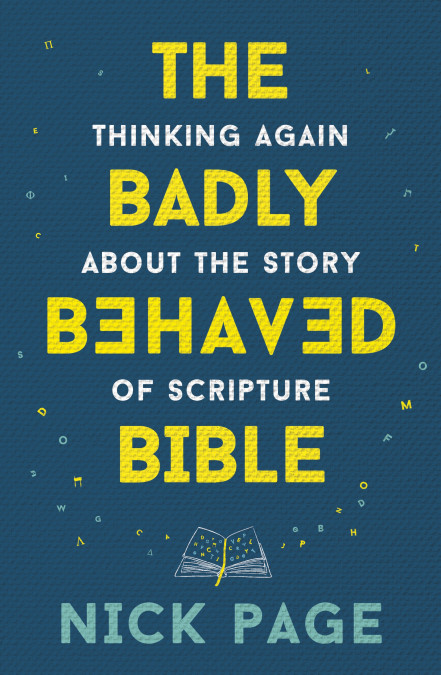The badly behaved Bible by Nick Page
As ever Page writes well, with obvious love for the scriptures, but there are weaknesses in some of the interpretations he presents
 The badly behaved Bible. Thinking again about the story of Scripture
The badly behaved Bible. Thinking again about the story of Scripture
By Nick Page
Hodder and Stoughton
ISBN 978-1-473-68619-9
Reviewed by Pieter J. Lalleman
I previously reviewed and warmly recommended two books by Nick Page, one on the King James Version of the Bible and one on Revelation. The present book is similar to the previous ones in that Page presents much factual information in a very light-hearted way. I smiled at least about once every two pages. In fact the book is heavy on facts but you don’t notice it so much.
Page discusses the inspiration of the Bible, its human authorship and canonisation. He emphasises that it is largely narrative but with other genres as well, and discusses the rough language it contains. He shows how God’s self-revelation develops over time and how the idea that there is only one God is a relatively late development. There is a chapter on the doubts of many biblical characters and authors. In the chapter on the authority of the Bible, Page shows how Jesus and Paul had nuanced views of the law and how we can hardly derive direct instructions from the Bible.
It is a strength of the book that there are many suggestions that readers should read for themselves parts of the Bible which are relevant to the subject under discussion; sometimes this reference is to a short passage, often to several chapters. On the downside, within each of his ten chapters Page discusses quite diverse things, often connected by association – and there are no indexes of texts or subjects.
The pre-final chapter looks at violence in the Bible, the contemporary hot potato. Page sets the tone by describing the temple as ‘a cross between an abattoir and a burger bar’ and accusing the Book of Joshua of ‘genocidal tendencies’. As he does with much of the Old Testament, he ascribes Joshua to the period of the exile and declares its historical value to be very limited – which brings him to a long discussion of the lack of historicity in the Old Testament in general. In the end he decides that the Bible portrays God in different, contrasting ways, and he opts for the ‘Christlike God’. As a discussion of the violence in the Bible I much prefer the recent book by Helen Paynter, God of violence yesterday. God of love today? which is more nuanced and more credible. You may also want to look at David Firth’s excellent commentary on Joshua in the series The Bible Speaks Today.
The final chapter briefly discusses how Jesus and the New Testament authors handle the Old Testament, saying that this is often ‘positively bizarre’. Scholars like Richard Hays have shown us that it is not bizarre and in my forthcoming (January 2020) book The hidden unity of the Bible I am popularising the work of Hays and others. Page is unhelpful here.
Despite Page’s obvious love for the Scriptures, his book basically offers a standard historical-critical view of the Scriptures which attributes most of the Old Testament to the period of the exile in Babylon. Among the authorities he quotes are Robert P. Carroll, who famously declared that Jeremiah is a fictional character, and James Barr. It’s disappointing that Page does not point to more conservative views on issues of dating, authorship and explaining alleged discrepancies.
In conclusion, Nick Page still writes well but I am not nearly as happy with this book as with his books on the King James Version and on Revelation.
The Revd Dr Pieter J. Lalleman teaches Bible at Spurgeon's College
Baptist Times, 02/08/2019